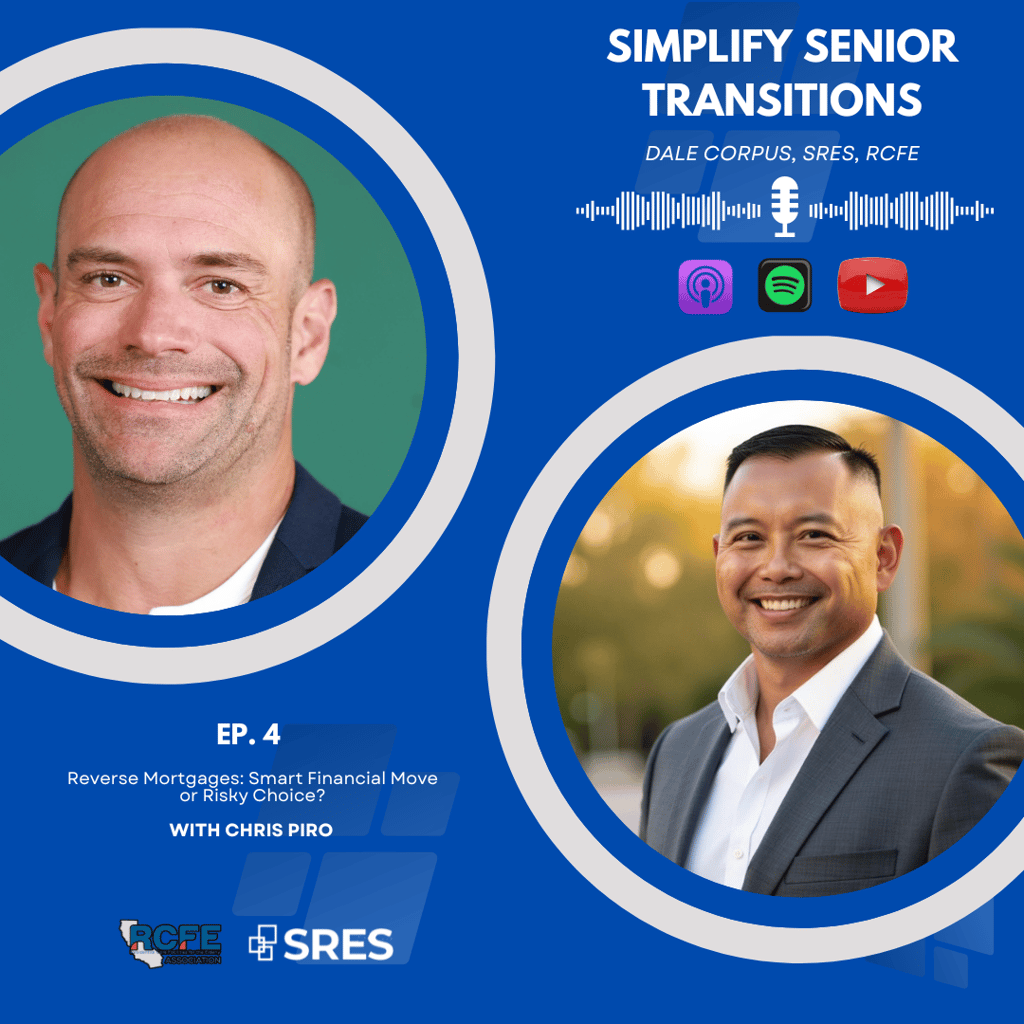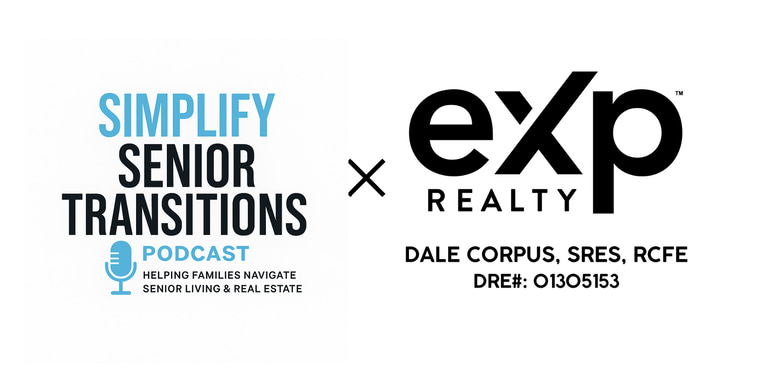Unlocking Home Equity: What Every Bay Area Family Should Know About Reverse Mortgages
How seniors can age in place, avoid selling their homes, and reduce financial stress—insights from lending expert Chris Pyro on the Simplify Senior Transitions Podcast
Dale Corpus
3/12/20255 min read
Navigating the complexities of senior transitions can feel like a full-time job, especially when you're an adult child trying to support your aging parents here in the Bay Area. From San Francisco's vibrant hills to the serene valleys of Napa and Solano, and across the bustling communities of Contra Costa, Alameda, Santa Clara, and San Mateo, the challenges of downsizing, choosing the right care, and managing finances are universal. We often grapple with tough questions: Should Mom and Dad sell their beloved home? How can they afford quality care without depleting their life savings?
That's why our latest Simplify Senior Transitions podcast episode is a must-listen. Host Dale Corpus, a senior transition specialist and real estate expert, sat down with Chris Piro, President and Broker of Searchlight Lending. With over 17 years in the lending industry and over a billion dollars in loans funded, Chris is a true expert in all types of real estate loans, including the often-misunderstood reverse mortgage. His insights are invaluable for families exploring financial tools that can allow seniors to access their home equity without selling, helping them live out their years comfortably.
Here's what you'll learn in this episode:
What a reverse mortgage is and how it works.
Who should and shouldn't consider getting one.
The biggest myths and misconceptions.
How it ties into senior transitions and real estate decisions.
Understanding Reverse Mortgages: A Financial Tool for Aging in Place
A reverse mortgage is essentially a government-backed FHA loan that allows seniors, generally aged 62 and over (though some programs start at 59.5), to use the equity in their primary residence. Unlike a traditional mortgage, the borrower is not required to make monthly loan payments. While they can make payments, if they don't, the interest accrues and is added to the principal balance. This flexibility can significantly improve monthly cash flow for seniors on a fixed income, especially with rising inflation.
It's crucial to understand that the property must remain the primary residence. If the homeowner moves out, the loan may be called due. The eligibility requirements are straightforward: primarily based on the homeowner's age, the property's estimated value, and any existing mortgage balance. Importantly, reverse mortgages are not credit-based; even those with low FICO scores or who are behind on current mortgage payments can qualify, making it a viable option for those struggling financially. In fact, Chris has used them to help people save their homes from foreclosure.
Different Options for Different Needs
The podcast highlights several types of reverse mortgages:
Conventional (HECMs): These are FHA-backed loans with limits currently around $1.2 million. They come in two main forms:
Lump Sum/Fixed Rate: A one-time payout with a fixed interest rate.
Line of Credit/Revolving: This acts like a credit card or home equity line, allowing funds to be used at will. A significant benefit is that the line amount can actually increase over the life of the loan, tied to inflation and property value. This is often preferred if funds aren't needed all at once.
Purchase Money Reverse Mortgage: This less-known option allows seniors to sell their current home, use the equity as a down payment on a new property, and never make payments on the new home. This is ideal for those looking to "right-size" to a smaller home without depleting their cash.
Jumbo Reverse Mortgage: For higher-value homes that exceed conventional loan limits, these are portfolio loans not insured by the government.
Second Mortgage Reverse: Allows homeowners to keep a low-interest first mortgage while accessing equity in a second position without payments.
Navigating Challenges: In-Home Care, Heirs, and Living Trusts
For many families, the desire for parents to age in place is strong. A reverse mortgage can be a powerful tool for this, allowing seniors to pay for in-home care, which can range from $5,000 to $8,000 per month. This financial flexibility can be the difference between staying in their familiar home or moving into an assisted living facility.
A common concern among adult children is the impact on their inheritance. Chris clarifies a major myth: the bank does not steal your home. A reverse mortgage is a loan, and any remaining equity after the loan is paid off goes directly to the beneficiaries in a similar fashion to a conventional mortgage. Beneficiaries typically have 12 months to either refinance the property or sell it to liquidate their inheritance.
Perhaps the most crucial advice for families revolves around living trusts. It is extremely important to have a living trust in place before obtaining a reverse mortgage. Without one, your family could face a lengthy and costly probate process upon your parent's passing. Furthermore, a living trust is vital if a homeowner becomes incapacitated (e.g., due to dementia) and can't legally sign documents. Without it, accessing funds for critical needs like medical care can be delayed by 6 to 8 months, requiring doctors, attorneys, and even court orders.
Important Considerations and Debunking Myths
While beneficial, reverse mortgages do have costs, typically being more expensive than conventional mortgages with higher interest rates and mortgage insurance. However, this mortgage insurance protects the homeowner against foreclosure even if the loan balance eventually exceeds the property's value.
A vital point that can't be overstated: homeowners are still responsible for paying their property taxes and homeowner's insurance. Failure to do so can lead to foreclosure, as the government does not tolerate late tax payments. For those without a fixed income, an "esback" (a set aside for taxes and insurance) might be required.
Chris also addresses the myth about running out of money: it is possible if not budgeted wisely, especially with a lump sum. He suggests talking to a financial advisor to manage funds and even consider investments. Lastly, he confirms that a reverse mortgage does not affect Social Security or Medicare benefits as it's an access to equity, not income.
The process typically takes 30-40 days and includes a mandatory credit counseling session to ensure the borrower understands all aspects of the loan. Properties must also be in decent condition, as repairs might be required before closing.
Deciding between a reverse mortgage and selling is deeply personal. If your loved one wants to live out their golden years in the comfort of their own home, a reverse mortgage is a perfect option. However, if they plan to move into assisted living or pass away in the near future, the upfront costs of a reverse mortgage might not make it worthwhile.
Take the Next Step for Your Family
Navigating senior transitions can be overwhelming, but you don't have to do it alone. If your loved one is considering a reverse mortgage or selling their home as part of a senior transition, schedule a FREE consultation with Dale Corpus. You can easily book using the Calendly link in the description box of the YouTube video, or visit www.simplifyseniortransitions.com.
We encourage you to listen to the full episode for all the detailed insights and rapid-fire questions! If you have a quick question, feel free to DM Dale on Instagram @soldbydale.
P.S. Got news or an amazing story to share? Hit us up at dale.corpus@exprealty.com and you might be featured in our next episode! Remember, always check out the transcript for detailed insights. Happy listening!
Watch The Podcast Here



Transitions Made Simple
Helping seniors transition with ease and peace.
📍 Serving the San Francisco Bay Area
📞 GET IN TOUCH
📬 STAY INFORMED
Dale Corpus, SRES, RCFE
📱 925-380-1657
📧 dale@simplifyseniortransitions.com
🕓 Available for free 15 min consultations by appointment
© 2026. All rights reserved.
Sign up for monthly senior transition tips & real estate insights.
